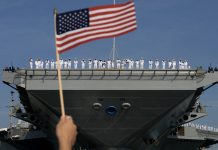As India has been aggressively confronting China with the hope of finding support from Washington, former US national security advisor (NSA) – John Bolton in an exclusive interview said there is no guarantee that Trump administration would have backed New Delhi in a possible India-China border clash.
Chinese Ambassador ‘Honey-Trapped’ Nepal PM KP Sharma Oli – Indian Reports
In an exclusive interview with Wion News, Bolton said – I’m not sure how much he (Donald Trump) understands the significance of the (India-China) border clash. I don’t think he (Trump) knows anything about the history of these clashes over the decades between India and China. He (Trump) may have been briefed on it, but history doesn’t really stick with him.”
Bolton further said – I don’t know which way he would go and I don’t think he knows either. I think Trump views the geostrategic ties with China for instance exclusively through the prism of trade. And trade is important because China has lifted intellectual property from the US and other nations, engaged in powerful technology transfers and it forms a major part of their economic success and therefore military power. And that’s really how far it goes.”
I don’t know what Donald Trump will do after the US presidential elections once the guard rail is removed. He’ll be back. He won’t be criticising China for putting Uyghurs in concentration camps or repressing Hong Kong. He will be back to the big China trade deal. So, if issues were to worsen between India and China, I’m not sure where he would come down,” he added.
On being questioned – if things were to escalate between India and China there is no guarantee that Donald Trump will back India against China?” Bolton said – that is correct.” I think his instinct for the next four months (till the elections) is to do anything that could hinder his election campaign. So what he would want is quiet along the border whether it benefits China or India.
Earlier, as EurAsian Times reported citing a Chinese expert for the Global Times – China has no plan to squeeze India’s strategic space and rather aims to explore ways for peaceful co-existence. However, the author claims that this is endangered by the strategic objectives of some Indians who want to contain China with the help of the US.
He blames the Indian media for fanning the flames between India and China. Tensions are provoked by this pressure and hence there is relentless support for India to join the US, Australia and Japan to contain China, wrote the author.
The author blames the US for destabilizing the India-China ties and claims that the US has dangerously interfered in China-India relations, such as labelling India “the world’s biggest democracy,” talking up the “Mumbai model,” and unscrupulously showing partiality towards New Delhi amid the border dispute.
The US, in particular, is fascinating India to counterbalance China and the idea of the Indo-Pacific Strategy is turning into a reality. He says that Indian elites are keen towards working with the US because they believe that by joining the US camp to contain China, they are now a world power on equal footing.




